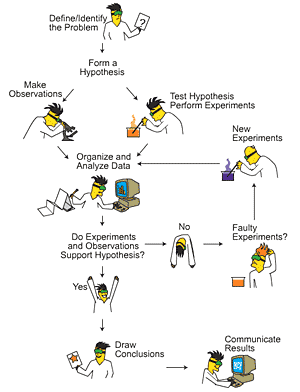The Scientific Process
Use the scientific process to guide your research for the Experimental Research category.
Scientific Process Flow Chart

Use the scientific process to guide your research for the Experimental Research category.

If you have any questions, please email us at
cemast@IllinoisState.edu.
If your project includes vertebrate animals, potentially hazardous agents, tissue, or human subjects, you will need to complete appropriate forms that can be downloaded from the Society for Science & the Public. Please attach your completed forms to the back of your poster. Failure to do so properly will result in disqualification from the symposium.
There are many potential sources of information for your project:
The sources you select for your project must be reputable and verifiable.
You may find a wealth of sources at your school or community library. Illinois State University's Milner Library may also be helpful. Try browsing the online catalog. You may also want to contact a Milner librarian, online or in person, for assistance.
Remember, anything included in your poster that is not your own, including text, figures, and/or tables, must be cited properly. Refer to the guidelines on the Abstract and Poster Information page.
Posters with plagiarized content will be disqualified from the symposium.
We encourage ISU High School Research Symposium participants to explore publishing their research. Here are two journals to consider:
The Journal of Emerging Investigators is an open-access journal that publishes original research written by middle and high school students in biological and physical science. JEI provides students, under the guidance of a teacher or advisor, the opportunity to submit and gain feedback on original research and to publish their findings in a peer-reviewed scientific journal. Because grade-school students often lack access to formal research institutions, we expect that the work submitted by students may come from classroom-based projects, science fair projects, or other forms of mentor-supervised research.
It is our goal to engage students in inquiry-based science with the intent to publish their high-quality work in a prestigious national journal. We promote the opportunity for students to develop their own research and scientific questions, submit their work, and receive critical feedback from Harvard-trained scientists. In summary, it is the intention of this publication to promote science education in its truest form: by developing questions and thinking about and testing hypotheses.